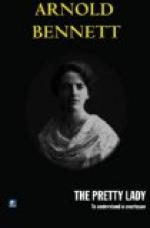He smelt gas, and then he felt cold water in his boots. Water was advancing in a flood along the street. “Broken mains, of course,” he said to himself, and was rather pleased with the promptness of his explanation. At the elbow of St. Martin’s Street, where a new dim vista opened up, he saw policemen, then firemen; then he heard the beat of a fire-engine, upon whose brass glinted the reflection of flames that were flickering in a gap between two buildings. A huge pile of debris encumbered the middle of the road. The vista was closed by a barricade, beyond which was a pressing crowd. “Stand clear there!” said a policeman to him roughly. “There’s a wall going to fall there any minute.” He walked off, hurrying with relief from the half-lit scene of busy, dim silhouettes. He could scarcely understand it; and he was incapable of replying to the policeman. He wanted to be alone and to ponder himself back into perfect composure. At the elbow again he halted afresh. And as he stood figures in couples, bearing stretchers, strode past him. The stretchers were covered with cloths that hung down. Not the faintest sound came from beneath the cloths.
After a time he went on. The other exit of St. Martin’s Street was being barricaded as he reached it. A large crowd had assembled, and there was a sound of talking like steady rain. He pushed grimly through the crowd. He was set apart from the idle crowd. He would tell the crowd nothing. In a minute he was going westwards on the left side of Coventry Street again. The other side was as populous with saunterers as ever. The violet glow-worms still burned in front of the theatres and cinemas. Motor-buses swept by; taxis swept by; parcels vans swept by, hooting. A newsman was selling papers at the corner. Was he in a dream now? Or had he been in a dream in St. Martin’s Street? The vast capacity of the capital for digesting experience seemed to endanger his reason. Save for the fragments of eager conversation everywhere overheard, there was not a sign of disturbance of the town’s habitual life. And he was within four hundred yards of the child’s arm and of the spot where the procession of stretcher-bearers had passed. One thought gradually gained ascendancy in his mind: “I am saved!” It became exultant: “I might have been blown to bits, but I am saved!” Despite the world’s anguish and the besetting imminence of danger, life and the city which he inhabited had never seemed so enchanting, so lovely, as they did then. He hurried towards Cork Street, hopeful.
Chapter 31
“ROMANCE”




